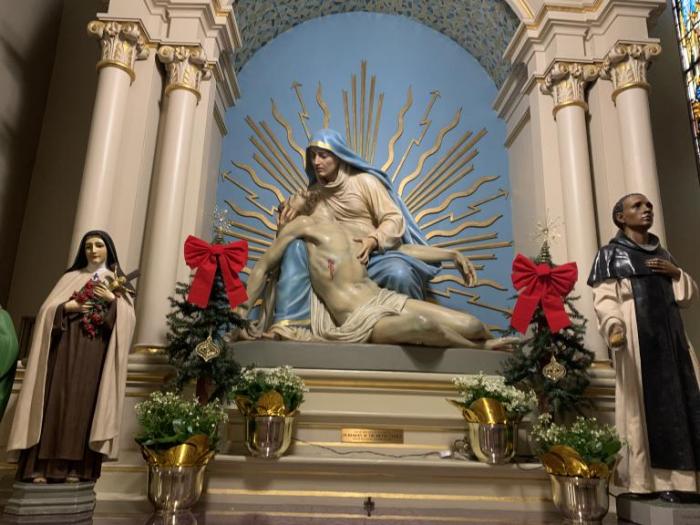A Tale of Two Pastors: Mark Driscoll and A (Medieval) New Year’s Proposal for the 2017 Church
This is a story of two pastors.
The first was a vicar in the deanery of Salisbury, England, in 1412. His name was Alexander Champion. He was accused of abusing his ecclesiastical authority by sexually exploiting the women in his care. His parishioners claimed he had slept with five of their wives, that he fathered children with his concubine, and that he made sexual advances toward women when they came to him for confession. Clearly Champion had some serious problems with the people of his parish. (You can see my 2010 article Three’s a Crowd: Wives, Husbands, and Priests in the Late Medieval Confessional if you want to know more about this).

Unfortunately we don’t know if Champion actually committed the crimes accused by his parishioners (he claimed he was innocent). But we do know he was called to account for the charges levied against him. As recorded by the contemporary register of John Chandler, dean of Salisbury from 1412-1417, Champion had to appear before the commissary in Salisbury Cathedral on January 19, 1413. If convicted, Champion risked losing his benefice (the local church) and possibly even his vocation as a priest (he could be barred from the clergy).
In other words, because of the medieval church structure in which priests were evaluated by their ecclesiastical superiors (who sought input from the local congregation about the performance of priests), Alexander Champion was held accountable to his congregation.
Which brings me to the second pastor in our story. His name is Mark Driscoll. He was a founder and lead pastor of the failed Mars Hill Church in Seattle (started in 1996). In the words of a February 2016 Daily Beast article, Driscoll is “one of the most famous and disruptive figures in the history of the evangelical mega-church movement.” Charges against Driscoll range from bullying, plagiarism, and misogyny to mishandling church money. Indeed, it is this final charge that most recently made headlines again when former members of Mars Hill filed a lawsuit against Driscoll for criminal racketeering.
What I find most interesting about the Driscoll story, however, is how long he continued to be supported by his congregants.
It took 14 years for his infamous rants against women on the church’s members-only online forum to be brought to light. Congregants and even leaders who disagreed with Driscoll found themselves bullied, fired, and replaced. Jennifer Roach (as reported by The Daily Beast) argued with Driscoll in 2003, only to have her husband told, “You better shut your wife up, or I’ll shut her up for you.” Instead of being shocked by Driscoll’s behavior, congregants accused Roach of trying to “take down a good man” and defamed Roach’s character instead of seeing the problems with Driscoll. Even when Driscoll replaced his elders with yes-men buddies, fired staff members, and revised the church bylaws to concentrate power in his hands, congregants still supported him. It wasn’t until 2014, when clear evidence showed how he had misspent church money and deceptively made his book Real Marriage a New York Times’ bestseller, that finally his kingdom cracked.
It took the news media, outside watchdogs, and growing complaints of church members to finally out the problems at Mars Hill. The medieval complaints of Alexander Champion’s congregants in Salisbury, however, were heard and addressed because of an ordinary visitation. The routine mechanism of the medieval church called Champion to account for the charges against him and established repercussions for conviction. Checks and balances existed to try and make sure medieval priests like Champion served God rather than serving themselves. Of course, the system had significant flaws and often failed (and I am sure most of you can think of medieval clergy even more infamous than Mark Driscoll); but at least there was a system for accountability.
In contrast, almost no effective accountability existed for Mark Driscoll. As the lead pastor who also served on the governing board of elders at Mars Hill, he was able to get rid of those who disagreed with him and concentrate power in his hands. What is absolutely astonishing to me is that he is still seems to be doing this. Go check out the website for his new church, The Trinity Church in Phoenix, AZ. Driscoll serves as the senior pastor and on the Governing Board which is the “legal governing board” for the church and does the “overseeing work of elders.” Driscoll is the only pastor of the four listed on the website to appear on the Governing Board, which means–once again–everything regarding church leadership flows through him.
So what’s the moral of our tale?
What if the 2017 church took a page from the medieval church and took pastoral accountability seriously? What if we helped pastors to flourish by keeping them humble and accountable to the people they serve instead of publishing coloring books featuring pastors like super heroes and declaring we should “protect our unity in supporting his vision” (yes, Steven Furtick really did this–see Jonathan Merritt’s article).
I think it was a 19th century British historian (Lord Acton?) who said that power corrupts and absolute power corrupts absolutely. Perhaps we should spend some time thinking about how power is distributed and controlled in our 2017 churches.
Better yet, maybe we should all just read George Orwell’s Animal Farm…..




